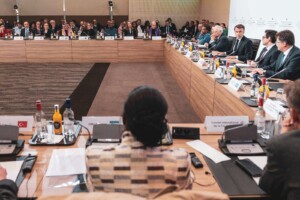OCHA: 151.300 people around El Geneina remain displaced and do not feel safe to return
The UN Office for the Coordination of Humanitarian Affairs (OCHA) issued a report yesterday on the emergency situation in West Darfur in the aftermath of the deadly violence in the state’s capital El Geneina last month.
 UN Flag (UN)
UN Flag (UN)
The UN Office for the Coordination of Humanitarian Affairs (OCHA) issued a report yesterday on the emergency situation in West Darfur in the aftermath of the deadly violence in the state’s capital El Geneina last month.

In its report, OCHA called the security situation in the city “calm but remains tense and unpredictable”. On 18 May, five people were killed in clashes in Gellu village 37km from El Geneina as armed men attacked the village. About 1,850 people temporarily fled across the border into Chad. The conflict allegedly started over a dispute between a group of herding nomads and a farming family in the area.
At least 40 farms were burnt and the generators used to irrigate the farms were looted. According to OCHA, access to water is a major issue after three boreholes in the wadi were destroyed during the fighting and the water yard is not functioning.
The same day, Radio Dabanga reported that markets in El Geneina were closed due to “ongoing lawlessness and security incidents”.
On May 19, protection sector monitoring teams visited Abu Zar camp for the displaced in El Geneina and explained that the residents of the camp need water, food, and non-food items, in addition to hygienic kits and health care. The team also indicated that the displaced people stated that they would like to return to Abu Zar once security is restored.
OCHA also reported that state authorities have requested additional humanitarian and shelter assistance to facilitate the return of internally displaced people (IDPs) before the rainy season starts.
According to the International Organisation for Migration (IOM), there are about 151,300 people, including roughly 30,300 families, seeking shelter in El Geneina and the surrounding villages.
OCHA reported that women and children are exposed to sexual and gender-based violence (GBV) and other protection risks. The organisation explained that there are many women-headed households among the IDPs in West Darfur, with associated vulnerability and related protection and livelihoods needs.
It has been over a month since the last wave of violence engulfed El Geneina. In April, at least 144 people died and over 233 were wounded when violence erupted after two Masalit tribesmen were killed by Arab tribesmen.
Earlier this month, Radio Dabanga reported that El Geneina neighbourhoods still resemble a ghost town and that the recurring violence in the city led to increased tension and deep polarisation.

Violent history
Darfur has a long history of strife between Arab herding tribes and non-Arab African herders or sedentary farmers, including the Masalit in West Darfur. Arab tribesmen were recruited by the previous regime of dictator Omar Al Bashir to join the Janjaweed militias. Al Bashir employed these Arab militias to repress a revolt over ethnic marginalisation in the region, mainly targeting non-Arab African farmers.
During the war that followed, at least 300,000 people were killed and over 2.5 million were displaced according to the UN.
Earlier this year In January, at least 163 people died in attacks on the city and adjacent Kerending camps as Arab herdsmen again targeted Masalit people.
The end of 2019 also saw violence at the Kerending camps in which more than 80 people were killed and at least 47,000 were displaced. The violence was linked to the previous regime as well and many militant herders who committed the violence drove in Rapid Support Forces* (RSF) vehicles.
In July 25, an attack by armed men on the West Darfur town of Misterei left at least 60 people dead, a third of the town was burned to the ground by gunmen affiliated with the previous dictatorship of Omar Al Bashir.









 and then
and then